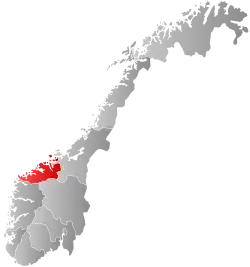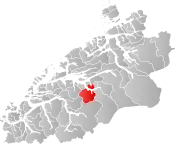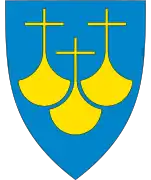Eid og Voll
Eid og Voll (historically: Voll og Eid) is a former municipality in Møre og Romsdal county, Norway. The 296-square-kilometre (114 sq mi) municipality encompassed most of the northwestern part of the present-day Rauma Municipality from 1840 until its dissolution in 1874. The administrative centre was the village of Voll.[2] Other villages in the municipality were Innfjorden and Eidsbygda.
Eid og Voll herred
Voll og Eid herred (historic) | |
|---|---|
 Møre og Romsdal within Norway | |
 Eid og Voll within Møre og Romsdal | |
| Coordinates: 62°32′00″N 07°26′00″E | |
| Country | Norway |
| County | Møre og Romsdal |
| District | Romsdal |
| Established | 1 Jan 1840 |
| • Preceded by | Grytten Municipality |
| Disestablished | 1 Jan 1874 |
| • Succeeded by | Eid and Voll municipalities |
| Administrative centre | Voll |
| Area (upon dissolution) | |
| • Total | 296 km2 (114 sq mi) |
| Population (1873) | |
| • Total | 1,743 |
| • Density | 5.9/km2 (15/sq mi) |
| Demonyms | Eiding Vollsokning[1] |
| Time zone | UTC+01:00 (CET) |
| • Summer (DST) | UTC+02:00 (CEST) |
| ISO 3166 code | NO-1537 |
History
The municipality of Voll og Eid (English: Voll and Eid) was established on 1 January 1840 when it was split away from Grytten municipality. According to the 1835 census the municipality had a population of 1,211.[3] [4]
Soon after the municipality was created, talk of dividing it began. On 10 September 1862, the Torvik, Monsås, and Hagen farms in Grytten Municipality were transferred to Voll og Eid Municipality. In 1863, the name was switched to Eid og Voll. On 1 January 1874, Eid og Voll Municipality was divided to create two municipalities: Eid (population: 1,048) and Voll (population: 695).[4]
During the 1960s, there were many municipal mergers across Norway due to the work of the Schei Committee. On 1 January 1964, these two municipalities were merged with the municipalities of Grytten, Hen, and part of Veøy to form the new Rauma Municipality.[4][5]
Name
The municipality is compound name made up of two areas along the Romsdalsfjorden: Eid and Voll. The first part of the name comes from the old Eid farm (Old Norse: Eið) since the first Eid Church was built there. The name comes from the word eið which means "isthmus" since the farm was located on an isthmus between two fjords.[6] The second part of the name comes from the old Voll farm (Old Norse: Vǫllr) since the first Voll Church was built there. The name comes from the word vǫllr which means "meadow" or "field".[7]
References
- "Navn på steder og personer: Innbyggjarnamn" (in Norwegian). Språkrådet.
- "Møtebøker og protokollar - Rauma kommune". Kulturnett Møre og Romsdal. Retrieved 30 June 2019.
- Registreringssentral for historiske data. "Hjemmehørende folkemengde Møre og Romsdal 1801-1960" (in Norwegian). University of Tromsø. Retrieved 28 October 2010.
- Jukvam, Dag (1999). Historisk oversikt over endringer i kommune- og fylkesinndelingen (PDF) (in Norwegian). Statistisk sentralbyrå. ISBN 9788253746845.
- "Administrasjonshistorisk Oversyn for Rauma Kommune" (in Norwegian). Archived from the original on 21 July 2011. Retrieved 28 October 2010.
- Rygh, Oluf (1908). Norske gaardnavne: Romsdals amt (in Norwegian) (13 ed.). Kristiania, Norge: W. C. Fabritius & sønners bogtrikkeri. p. 228.
- Rygh, Oluf (1908). Norske gaardnavne: Romsdals amt (in Norwegian) (13 ed.). Kristiania, Norge: W. C. Fabritius & sønners bogtrikkeri. p. 224.

